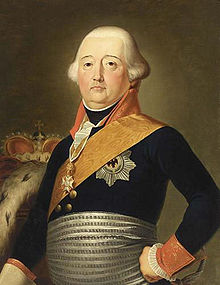Hermann, Prince of Hohenzollern-Hechingen
| Hermann | |||||
|---|---|---|---|---|---|
| Prince of Hohenzollern-Hechingen | |||||
 |
|||||
| Prince of Hohenzollern-Hechingen | |||||
| Reign | 9 April 1798 – 2 November 1810 | ||||
| Predecessor | Josef Friedrich Wilhelm | ||||
| Successor | Friedrich Hermann Otto | ||||
| Born |
30 July 1751 Lockenhaus (Léka), Vas County, Kingdom of Hungary |
||||
| Died | 2 November 1810 (aged 59) Hechingen, Hohenzollern-Hechingen |
||||
| Spouse | Countess Louise of Merode-Westerloo Princess Maximiliane of Gavre Princess Maria Antonia of Waldburg-Zeil-Wurzach |
||||
| Issue | Princess Luise Friedrich Hermann Otto Princess Maria Antonia Princess Maria Theresia Princess Franziska Theresia Princess Maria Maximiliane Princess Josephine |
||||
|
|||||
| House | House of Hohenzollern-Hechingen | ||||
| Father | Prince Franz Xaver of Hohenzollern-Hechingen | ||||
| Mother | Princess Anna Maria of Hoensbroech-Geulle | ||||
| Full name | |
|---|---|
| German: Hermann Friedrich Otto |
Hermann Friedrich Otto (* 30 July 1751 in Lockenhaus (Léka), Vas County, Kingdom of Hungary; † 2 November 1810 in Hechingen) was the ruling Prince of Hohenzollern-Hechingen from 1798 until 1810.
Prince Hermann Friedrich Otto was entrusted with the welfare of his land, when he came to power in April 1798. He was raised in Belgium, where his father, Prince Franz Xaver of Hohenzollern-Hechingen (1719–1765), was an imperial officer. From his mother, Princess Anna Maria of Hoensbroech-Geulle ( 8 May 1729 – 26 September 1798), Prince Hermann inherited his Dutch holdings. From his second wife, Princess Maximiliane of Gavre, Marquise d'Aysseau, he inherited one billion Francs.
His first spouse, Countess Louise of Merode-Westerloo, died after only one year of marriage. In 1779, Prince Hermann married his third wife, the Princess Maria Antonia of Waldburg-Zeil-Wurzach.
After the transfer of the left bank of the Rhein to France as part of war reparations, he tried to find money for the beautification of Hechingen and the improvement of roads. All of his activities served to increase the fortune of his House.
Prince Hermann was an Imperial-Field Marshal General and a Prussian Lieutenant General. The situation of the princedom between the time of the Second Congress of Rastatt and the end of the Empire, the Prince's debut was actually quite relaxed. Soon after his ascension to power, he held peace talks with the local land holders, and came to a mutual agreement June, 1795 in Hechingen with the local land holders. He then disbanded, the daily joyful homage festivals from a couple of free movements of all subjects of bondage. The village of Bisingen missed out on this because it would not enter into the agreement. In addition the village would not pay homage (since that time the Bisingers carry the nickname "Nichthuldiger“ meaning those who don’t pay homage.) The prince confined his hunts to three of his lands, outside of these lands, animals could be hunted by the peasants. The lands not within set borders were parceled out or sold. The serfdom, as far as legal dependents protected by the prince was concerned, was abolished. This weighed heavily upon them, however. The monarchy was appointed five percent of the estate.
...
Wikipedia
